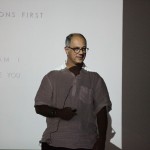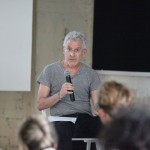 According Architecture Ukraine residence program, on August, 14th lecture In Balance was held by architect from UK Mike Lawless and Housing Questions: Architecture and/as Humanitarianism by Andrew Herscher (University of Michigan, USA).
According Architecture Ukraine residence program, on August, 14th lecture In Balance was held by architect from UK Mike Lawless and Housing Questions: Architecture and/as Humanitarianism by Andrew Herscher (University of Michigan, USA).
Mr. Lawless spoke about the possibilities of architecture and human needs.
“The World is in trouble. War, religious and ethnic intolerance, empire building, greed, hunger, overpopulation, environmental destruction. Throughout history it is the same and has developed to the current state. It’s the nature of man. We are a virus and we destroy. In the talk Mike wants to question how we feel. How do you feel about your World? How do you feel about your country? How do you feel about your street? How do you feel about your home? How do you feel about yourself? Is the environment around you getting better, or worse? How can things get worse when we have more? How much is enough? Is there a Balance? Can design help?”, – said Mr.Lawless.
Mr. Herscher spoked about contemporary humanitarianism, refugees are provided credit or debit cards loaded with “digital vouchers” for their food and shelter expenses. This “voucher humanitarianism,” undertaken by NGOs in partnership with credit card companies, mobile phone companies, banks, and other businesses, has yielded what has already been called “digital food,” as well as a form of housing relief that, replacing the refugee camp, will doubtlessly soon invoke the term “digital shelter.”
In this talk, Andrew Herscher places the emergence of “digital shelter” in the context of humanitarianism’s historical engagement with questions of housing. In terms of this history, the refugee camp might represent one of the last places where the interests of humanitarianism and architecture have intersected, as “digital shelter” renders the housing market in the city-as-such a refuge for refugees. Normalising precarity, this rendering disposes of the housing question as a provocation to imagine other forms of housing, if not other ways of living in common. What, if any, political future, then, does the technological novelty of “digital shelter” open onto?






















